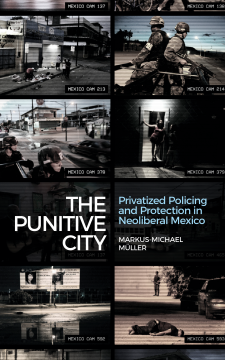
Additional Information
Book Details
Abstract
In the eyes of the global media, modern Mexico has become synonymous with crime, violence and insecurity. But while media fascination and academic engagement has focussed on the drug war, an equally dangerous phenomenon has taken root. In The Punitive City, Markus-Michael Müller argues that what has emerged in Mexico is not just a punitive urban democracy, in which those at the social and political margins face growing violence and exclusion. More alarmingly, it would seem that clientelism in the region is morphing into a private, political protection racket.
Vital reading for anyone seeking to understand the implications of a phenomenon that is becoming increasingly widespread across Latin America.
Markus-Michael Müller is an assistant professor of Latin American politics at the Freie Universität Berlin. His work has focused on transnational security governance, postcolonial state formation, and the urbanization of neoliberalism. He is the author of Public Security in the Negotiated State: Policing in Latin America and Beyond (2012).
'[A]n outstanding contribution to critical urban security studies.'
European Review of Latin American and Caribbean Studies
‘Müller offers a wealth of original and stimulating insights, including a critical exploration of the role of the transnational NGO-Foundation-Academic nexus in vernacularizing common principles of punitive urban security governance throughout the region and beyond.’
John Gledhill, author of The New War on the Poor: The Production of Insecurity in Latin America
‘Müller’s work on urban security is deeply compelling. He makes the institutional, political and community consequences of Mexico City’s punitive turn legible through exacting empirical insight. This is not just analytically productive, but also absolutely necessary for a thoughtful analysis of violence and urban life in Latin America.’
Graham Denyer Willis, author of The Killing Consensus: Police, Organized Crime and the Regulation of Life and Death in Urban Brazil
‘Provides wonderful insights into the complex practices of security in contemporary Mexico City. Building on strong foundations in theory and on-the-ground data this book blazes a new trail in understanding the multiple layers of security debates in Latin America’s largest city and the region more generally.’
Enrique Desmond Arias, author of Drugs and Democracy in Rio de Janeiro
‘Müller’s conceptually sophisticated and empirically grounded critical gaze spares nobody and nothing.’
Wil G. Pansters, Utrecht University/University of Groningen
Table of Contents
| Section Title | Page | Action | Price |
|---|---|---|---|
| Cover | Cover | ||
| About the Author | i | ||
| Title Page | iii | ||
| Copyright | iv | ||
| Contents | v | ||
| Acknowledgements | vii | ||
| Abbreviations | x | ||
| Introduction | 1 | ||
| Latin America’s New Urban Punitiveness | 2 | ||
| Securitizing Democracies | 5 | ||
| Mexico City as a ‘Workshop’ of Punitive Urban Democratization | 9 | ||
| Organization of the Book | 13 | ||
| 1 The Making of the Punitive City | 17 | ||
| The Punitive Logic of Urban Neoliberalism in Mexico City | 19 | ||
| Lawfare à La Mexicana | 28 | ||
| Punitive Democratization | 32 | ||
| The Consequences of Punitive Democratization | 37 | ||
| Conclusion | 45 | ||
| 2 Neoliberal Insecurities and Resilient Clientelism | 47 | ||
| Clientelism in Mexico City: Then and Now | 49 | ||
| Clientelism and (in)Security | 61 | ||
| Conclusion | 71 | ||
| 3 Lawfare and Resistance at the New Urban Frontier | 73 | ||
| Urban Renaissance in the Old Merced Area | 75 | ||
| Changing Patterns of Illegal Entrepreneurship and Political Regulation in Tepito | 84 | ||
| Conclusion | 95 | ||
| 4 Securitizing Civic Activism | 97 | ||
| Selling Security in the Punitive City | 100 | ||
| Playing the NGO Game | 110 | ||
| Conclusion | 116 | ||
| 5 Self-Policing, Commodified Protection and Community Justice | 119 | ||
| Self-Policing in Mexico City | 120 | ||
| The Informal Privatization of Policing | 128 | ||
| Private Security and Gated Communities | 132 | ||
| Indigenous Justice | 136 | ||
| Conclusion | 142 | ||
| Conclusion | 143 | ||
| References | 153 | ||
| Index | 171 |
